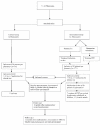Effect of medication review and cognitive behaviour treatment by community pharmacists of patients discharged from the hospital on drug related problems and compliance: design of a randomized controlled trial
- PMID: 20230611
- PMCID: PMC2850341
- DOI: 10.1186/1471-2458-10-133
Effect of medication review and cognitive behaviour treatment by community pharmacists of patients discharged from the hospital on drug related problems and compliance: design of a randomized controlled trial
Abstract
Background: Drug related problems (DRPs) are common among elderly patients who are discharged from the hospital and are using several drugs for their chronic diseases. Examples of drug related problems are contra-indications, interactions, adverse drug reactions and inefficacy of treatment. Causes of these problems include prescription errors and non-compliance with treatment. The aim of this study is to examine the effect of medication review and cognitive behaviour therapy of discharged patients by community pharmacists to minimize the occurrence of drug related problems.
Methods/design: A randomized controlled trial will be performed. Community pharmacists will be randomized into a control group and an intervention group. 342 Patients, aged over 60 years, discharged from general and academic hospitals, using five or more prescription drugs for their chronic disease will be asked by their pharmacy to participate in the study. Patients randomized to the control group will receive usual care according to the Dutch Pharmacy Standard. The medication of patients randomised to the intervention group will be reviewed by the community pharmacist with use of the national guidelines for the treatment of diseases, when patients are discharged from the hospital. The Pharmaceutical Care network Europe Registration form will be used to record drug related problems. Trained pharmacy technicians will counsel patients at home at baseline and at 1,3,6,9 and 12 months, using Cognitive Behaviour Treatment according to the Theory of Planned Behaviour. The patient's attitude towards medication and patient's adherence will be subject of the cognitive behaviour treatment. The counselling methods that will be used are motivational interviewing and problem solving treatment. Patients adherence towards drug use will be determined with use of the Medication Adherence Report Scale Questionnaire. There will be a follow-up of 12 months.The two primary outcome measures are the difference in occurrence of DRPs between intervention and control group and adherence with drug use. Secondary endpoints are attitude towards drug use, incidence of Re-hospitalisations related to medicines, functional status of the patient, quality of life and the cost-effectiveness of this intervention.
Discussion: Combining both medication review and Cognitive Behaviour Treatment may decrease DRPs and may result in more compliance with drug use among patients discharged from the hospital and using 5 or more chronic drugs.
Trial registration: Dutch Trial Register NTR1194.
Figures
Similar articles
-
Drug related problems identified by European community pharmacists in patients discharged from hospital.Pharm World Sci. 2004 Dec;26(6):353-60. Pharm World Sci. 2004. PMID: 15683106
-
Pharmacists' performance of clinical interventions during adherence support medication reviews.Res Social Adm Pharm. 2014 Jan-Feb;10(1):185-94. doi: 10.1016/j.sapharm.2013.04.008. Epub 2013 May 17. Res Social Adm Pharm. 2014. PMID: 23688540
-
Drug-related readmissions to medical units of older adults discharged from acute geriatric units: results of the Optimization of Medication in AGEd multicenter randomized controlled trial.J Am Geriatr Soc. 2013 Jan;61(1):113-21. doi: 10.1111/jgs.12037. Epub 2012 Dec 18. J Am Geriatr Soc. 2013. PMID: 23252914 Clinical Trial.
-
Can clinical pharmacy services have a positive impact on drug-related problems and health outcomes in community-based older adults?Am J Geriatr Pharmacother. 2004 Mar;2(1):3-13. doi: 10.1016/s1543-5946(04)90002-5. Am J Geriatr Pharmacother. 2004. PMID: 15555474 Review.
-
[Role of Community Pharmacists in Home Healthcare].Yakugaku Zasshi. 2018;138(6):791-795. doi: 10.1248/yakushi.17-00209-3. Yakugaku Zasshi. 2018. PMID: 29863049 Review. Japanese.
Cited by
-
Patient risk factors for developing a drug-related problem in a cardiology ward.Ther Clin Risk Manag. 2014 Dec 17;11:9-15. doi: 10.2147/TCRM.S71749. eCollection 2015. Ther Clin Risk Manag. 2014. PMID: 25565852 Free PMC article.
-
Alcohol and prescription drug safety in older adults.Drug Healthc Patient Saf. 2013;5:13-27. doi: 10.2147/DHPS.S38666. Epub 2013 Feb 25. Drug Healthc Patient Saf. 2013. PMID: 23467625 Free PMC article.
-
Cost-effectiveness of a clinical medication review in vulnerable older patients at hospital discharge, a randomized controlled trial.Int J Clin Pharm. 2019 Aug;41(4):963-971. doi: 10.1007/s11096-019-00825-3. Epub 2019 Jun 17. Int J Clin Pharm. 2019. PMID: 31209718 Free PMC article. Clinical Trial.
-
A non-randomized, controlled, interventional study to investigate the effects of community pharmacists' cognitive behavioral therapy-based interventions on medication adherence and relevant indicators in patients with depression.BMC Psychiatry. 2023 Feb 24;23(1):124. doi: 10.1186/s12888-023-04602-5. BMC Psychiatry. 2023. PMID: 36829184 Free PMC article. Clinical Trial.
-
Successful care transitions for older people: a systematic review and meta-analysis of the effects of interventions that support medication continuity.Age Ageing. 2020 Jul 1;49(4):558-569. doi: 10.1093/ageing/afaa002. Age Ageing. 2020. PMID: 32043116 Free PMC article.
References
Publication types
MeSH terms
LinkOut - more resources
Full Text Sources



